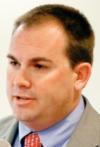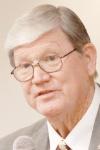Candidates in Wayne County's two competitive legislative races tackle the issues
By Matthew Whittle
Published in News on October 21, 2012 1:50 AM
The News-Argus spoke to the five candidates running in the two competitive N.C. House of Representatives races about five areas of importance.
The candidates for House District 4 are incumbent Republican Jimmy Dixon of Duplin County, Democrat Rebecca Judge of Duplin County and Libertarian Kevin Hayes of Wayne County. District 4 includes parts of Wayne and Duplin counties.
The candidates for House District 10 are Republican John Bell IV of Wayne County and Democrat James Hardison of Lenoir County. District 10 includes parts of Wayne, Lenoir, Greene and Craven counties.
TAXES AND TAX REFORM
John Bell
He believes that tax reform is necessary in order to create a more competitive business environment in North Carolina, and that the corporate income tax, which only accounts for 4 percent of the state budget, should be the first area of focus.
"Our tax code is out of date. That corporate tax could be eliminated and it really wouldn't have that big of an effect on revenues, but would be very attractive to business. We've got to have jobs in eastern North Carolina and the only way to do that is to improve the business climate."
He also would like to look at doing the same to the personal income tax, while also capping the gas tax. He also said he would not favor raising the sales tax to bring in any additional revenue.
"I'm not in favor of raising any type of tax. I don't think Raleigh has a revenue problem, I think it has a spending problem."
Jim Hardison
"As with any citizen, I don't want to be paying any more in taxes."
But any cuts to the state income tax, he said, would have to be made carefully.
"If you reduce that much revenue, you have to know what spending you're going to reduce."
He did, however, say he could see the corporate income tax being cut, but that he doesn't "see us having a zero percent corporate tax rate."
And, he added, any potential offsetting of income tax increases with sales tax increases would need to be "studied carefully."
Jimmy Dixon
He explained that the legislative leadership in the GOP has said this will be a top priority this coming session, but that it's "a very complex issue."
He, too, said the goal is to reduce or eliminate the corporate income tax and to try to do the same with the personal income tax.
"I believe that if we properly do it, the income that we (as a state) give up will be replaced from growth. I'm not interested in producing more revenue. I don't think we have a revenue problem, I think we have a spending problem."
He did say, though, that in making any reforms, "we must not make the cure worse than the disease."
Rebecca Judge
Any changes to the tax code, she said, would have to be made cautiously and carefully.
"It would be nice if we could actually eliminate the personal income tax, but I can't say at the point if that's the thing to do."
She would, however, be in favor of using the sales tax to offset any revenue losses.
"I don't have any opposition to increasing the sales tax. People are going buy whatever they want to buy, and most of the time they won't notice the difference in price. I think that's a great way to gain revenue.
Kevin Hayes
"I think my approach to tax reform is different than anyone else's."
For him, his first target is the personal income tax, which he wants to abolish and replace the revenue either through a sales tax or a higher corporate income tax.
"My personal preference would be to study it and see what's best for the state, and then I would prefer the people vote on how to replace it.
"I'm also in favor of abolishing property taxes. I believe it violates private property rights. We should give our counties the opportunity to replace it with consumption taxes or another revenue source."
"We must reduce the gas tax.We need to not only cap it, but reduce it."
BUDGE AND STATE SPENDING
John Bell
He stated again how Raleigh has a spending problem, but that one that should be protected in classroom funding.
"One area we do not want to cut is funding for the classroom. I'd like to see us put more money into the classroom and give local school boards more control over how to spend that money."
The way to do that, he said, is to cut back on the bureaucracy in the state Department of Public Instruction.
He also said he would support a merit-based pay system for teachers.
Beyond that, he said, every area of the state budget needs to be examined -- particularly the numerous boards and commissions that have been created by the state and that receive state funding.
"Across the board, I think we need to learn how to do more with less. That's no different than what the private sector is doing."
And, he said, while that might mean some spending cuts might hurt, it has to be done.
"Our state has spent and spent and we are at a point we can't do it anymore. This is going to be a tough budget year."
Jim Hardison
He did not indicate what, if any areas of the budget he thought needed to be trimmed, but he did say he wanted to protect both the economic incentive systems that provide state grants to counties like Wayne.
"We need to be able to recruit jobs."
He also said that he wanted to protect education spending on both public school and community college levels.
"We've got to have an educated work force. I see our commitment there eroding. Our teachers need to feel they have the support, not only of the parents and central office, but also of the legislators."
He also criticized Republicans for wanting to cut programs even as they approve spending increases in other areas, such as the number of political appointees the governor can hire and how much they can be paid, as well as how much he can spend on his inauguration.
Jimmy Dixon
While he supports reducing the state budget, he did say that "we cannot wean off spending rapidly."
Still, he pointed to several areas where cuts can be made, including public television, state museums and the state symphony.
"Museums are nice, but if we're not doing what we need to in terms of education, what's more important. Symphonies are nice, but if we're not doing what we need to for our state employees, what's more important."
He also expressed concern that the various state departments don't even know how many vehicles they have on the roads.
Still, the one area he said he wants to protect is education -- in the classroom, not at the Department of Public Instruction in Raleigh.
"We're spending more per pupil than ever before. Have we seen an corresponding increase in performance? Yet every year we spend more money per pupil. The answer is not necessarily spending more money."
Rebecca Judge
"What I would consider is first looking at each department and cutting the fat. There is probably money available if we can cut out the waste, fraud and abuse. I see waste all around."
She, too mentioned the unknown number of state vehicles on the roads.
And she, too, said education cannot afford to be cut anymore, and that last year's cuts -- upward of $190 million in K-12 -- needs to be restored and the 3,400 teachers and teacher assistants re-hired and classroom sizes kept small "so teachers are able to give each student the individual attention they need and deserve."
"Education is so vital."
She did say, though, that she would advocate giving local officials more control in terms of how to spend their education funds.
Kevin Hayes
Also referencing the number of state vehicles, he said his first "preference would be to reduce spending so we're able to reduce the tax burden on our citizens."
"There definitely need to be cuts across the board" -- including in education, though not in the classroom.
"I do not believe any one item (such as education) should be over 50 percent of the entire state budget. A lot of the problem is mismanagement of funds. We can find ways to manage our funds better and we can find ways to ensure education is properly funded. But the things that are not constitutionally required should be on the county level" -- particularly anything extracurricular, in which he also would advocate allowing home and private school students the ability to participate.
REGULATIONS AND REGULATORY REFORM
John Bell
He said that as the General Assembly looks at regulations that need to be changed, special attention needs to be paid to farmers and agriculture, many of which are also small businesses.
Jim Hardison
He said he would be willing to look at any regulation that created a burden, but that it should be done carefully and only after much study.
"I don't think we need to do anything to hurt businesses, but it's interesting we talk about how we need to reduce regulations when, on the other hand, we're passing more legislative bills than ever before."
Jimmy Dixon
He said lots of strides were made during the last legislative session, but that more were still needed, referencing those surrounding livestock production, food preparation and trucking in particular.
The key, though, he said, even more than changing the regulations is changing the regulatory culture and the "dictatorial attitude" of regulators.
"The biggest change is philosophical. We want regulators to treat the people they're regulating like customers. (People told us) 'We recognize the need to regulate ourselves, we just want regulators to be helpful, not detrimental.'"
Rebecca Judge
She also said that while she would be open to looking at regulations, that any changes should be made "very cautiously," especially when it comes to issues of clean air and water.
"I have a lot of concerns about the Department of Environment and Natural Resources. I think there's a reason for regulations, and I think before any are decreased, it needs to be looked at very deeply. If we don't it will poison us."
Kevin Hayes
He also said that he thought important steps have been made, but that they need to go further.
"We're moving in the right direction. If something is burdensome, it needs to be eliminated or reduced. I'm a firm believer that the less government regulation the better. Government just gets in the way of job creation."
PRIORITIES FOR EASTERN NORTH CAROLINA
John Bell
Much of what eastern North Carolina needs in terms of jobs and more, he said, comes back to a lack of infrastructure, and especially the need to make sure the upgrade to U.S. 70 continue -- something that will open up the Global TransPark and make the region more attractive to business and industry.
The key, though, he said, will be for all eastern North Carolina delegates to work together in a formal or informal eastern North Carolina caucus, especially after the region lost five or six legislators to redistricting.
"We have to regionalize. We have to realize that if one county around us benefits, we all benefit, and if one county around us hurts, we all hurt." "We all love eastern North Carolina. This is our home."
Jim Hardison
For him, jobs is priority No. 1 with the military and Seymour Johnson Air Force Base and the need to defeat the proposed coastal wind farm a close second. But he, too, said meeting those challenges will require the cooperation of all legislators.
"We need to be mindful that this requires a total approach, everybody working together to improve the quality of life in eastern North Carolina."
Jimmy Dixon
With his focus on eastern North Carolina's farms, military and small businesses, he said the region has a lot of positives and is important to the rest of the state. However, he also said that capitalizing on that will require a bi-partisan effort of all remaining eastern North Carolina legislators.
"Our political strength east of I-95, relative to the voting power in the General Assembly has been diminished. However, the upper echelons of the leadership are very favorable toward eastern North Carolina. Legislators east of 95, irregardless of party need to unite our voices and our votes to make sure that we receive the appropriations, particularly in terms of transportation infrastructure, that eastern North Carolina gets a fair and reasonable seat at the decision-making table."
Rebecca Judge
For her, job creation is the primary focus -- as well as all the factors that play into that, including good schools, incentives and a clean environment.
"I'm not savvy enough to know all about how to bring jobs back to eastern North Carolina, but I know we need to make more things here and sell them to other countries."
Kevin Hayes
His primary focus, he said, will be protecting the region's economic engines -- its military bases, especially Seymour Johnson from not only the windfarm and other energy projects, but also any other factors that could put it at risk during the next Base Realignment and Closure process.
If we lose Seymour Johnson Air Force Base, then that's it for Goldsboro and Wayne County's economy. We need to do whatever we need to in order to keep it open."
ETHICS
John Bell
He believes the ethics climate in Raleigh is improving, especially with the potential of nearly 50 percent of legislators to be freshmen this year.
"Whenever you have people who go up there for the wrong reasons, you're going to have ethical issues. It's time for people who really want to go and make a difference for their district, not just themselves. When I'm elected, I'll have 84,000 bosses and I'm accountable to the people of District 10. There are really some good Republicans and Democrats going to Raleigh and fighting for what they believe is best for this state, and we've got a lot of good candidates in eastern North Carolina."
Jim Hardison
He said that Raleigh has continued to have a number of ethical problems over the last few years, but that he believes he can play a role in reversing that trend.
"Integrity and ethics is one of the strong traits I bring to the table."
Jimmy Dixon
He, too, believes that Raleigh's ethics are improving and that during the last legislative session a strong zero-tolerance tone was adopted by the General Assembly's leadership -- both for legislators and staffers alike.
"I'm going to say the climate is better. It's been my experience that this is truly a non-partisan issue."
Rebecca Judge
"No it has not improved, and it is a shame and a disgrace."
One problem, she said that contributes to a poor ethical climate is the poisonous political atmosphere that exists. But that's also something she hopes she can improve.
"That's something that I hope to go work toward. We need to cooperate and stop fighting against each other and work together to improve the situation. We need to be nice to people."
Kevin Hayes
"I do not think it's improved. The morals of this country are moving away from Biblical principles."
The key, he said, is to hold legislators more accountable.
"When you have questions if somebody's done something ethically wrong, there needs to be an immediate investigation and legislators suspended."
He also said he would support legislation creating a recall system to replace legislators between elections, as well as term limits to keep people from becoming too comfortable in their positions.
He also said he would support improving the state's open meetings and open records laws in order to provide more information to citizens.





